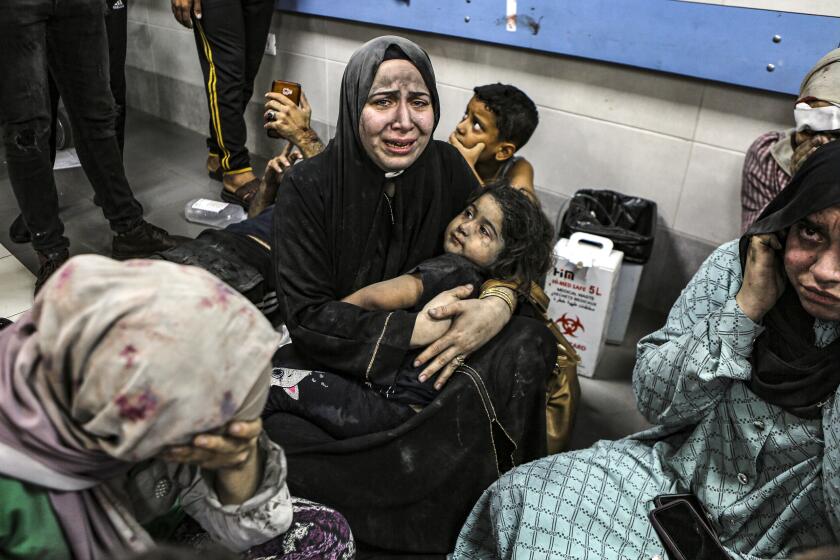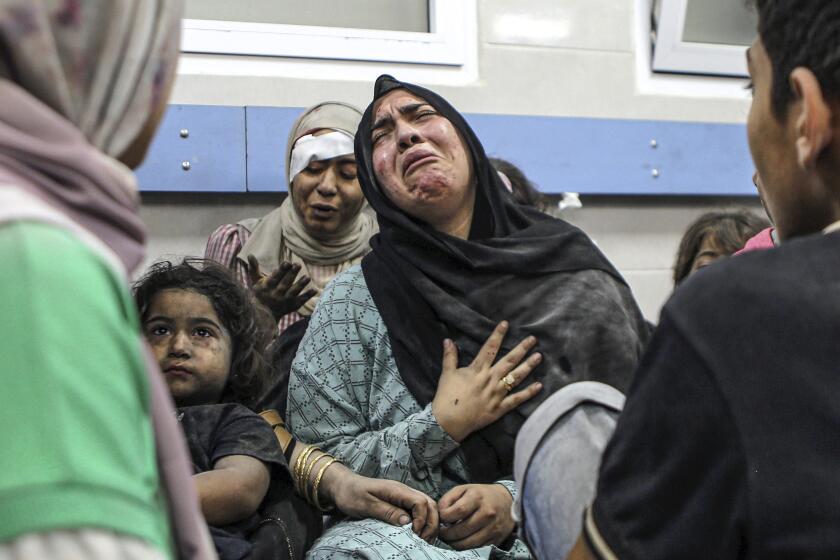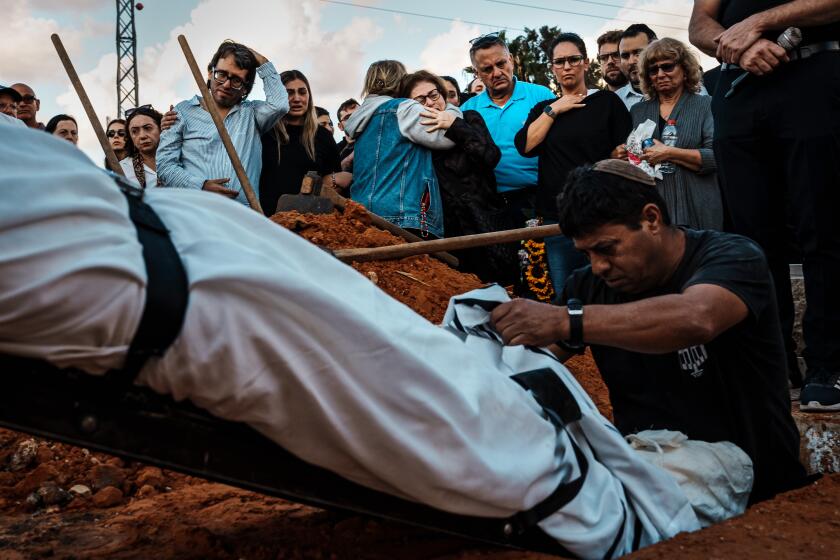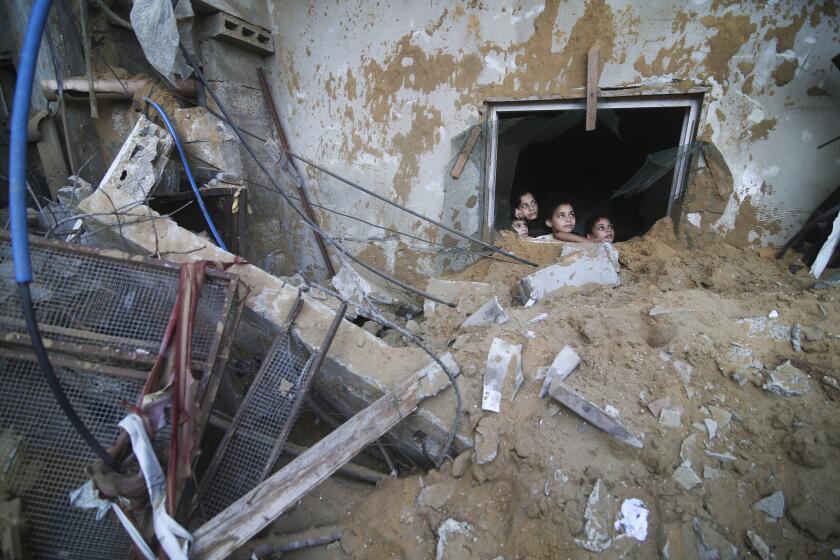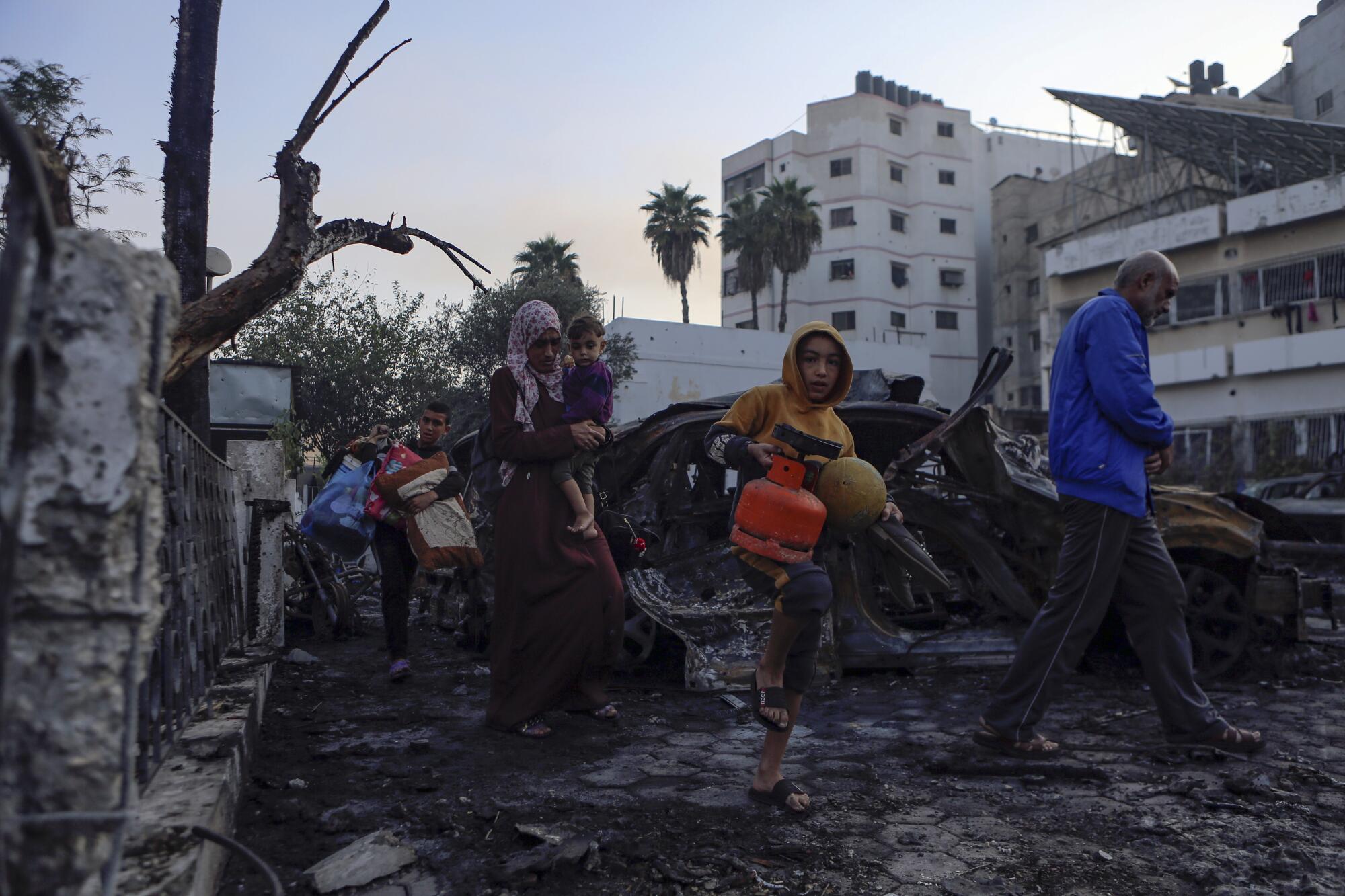
KHAN YOUNIS, Gaza Strip â Israel said Wednesday that it will allow Egypt to deliver limited quantities of humanitarian aid to the Gaza Strip, the first crack in a 10-day siege on the territory. A massive blast at a Gaza City hospital that killed hundreds the day before put immense strain on Gaza doctors treating the wounded as medical supplies ran out.
The announcement to allow water, food and other supplies came as rage over Tuesday nightâs blast at Ahli Arab Hospital spread across the Middle East, and just as President Biden visited Israel in hopes of preventing a wider conflict in the region.
There were conflicting claims of who was responsible for the explosion. Hamas officials in Gaza quickly blamed an Israeli airstrike, saying nearly 500 were killed. Israel denied it was involved and released a flurry of video, audio and other information that it said showed the blast was instead due to a rocket misfire by Islamic Jihad, another militant group operating in Gaza. Islamic Jihad dismissed that claim.
The Associated Press has not independently verified any of the claims or evidence released by the parties.
Israel shut off all supplies to Gaza soon after Hamas militants rampaged across communities in southern Israel on Oct. 7. The new carnage at the hospital threw the siegeâs impact into sharp relief.
Hundreds of wounded were rushed to another hospital, nearly out of supplies and fuel for its generators, and doctors performed surgery on the floors, often without anesthesia.
At the Rafah crossing, Gazaâs only connection to Egypt, truckloads of aid have been waiting for days to enter. But the facility has only a limited capacity. Egypt must still repair the road across the border that was cratered by Israeli airstrikes.
Israel and the Palestinian militant group Hamas appear set to go head-to-head on the ground in Gaza. Whatâs each sideâs endgame?
Israeli Prime Minister Benjamin Netanyahuâs office said the decision was approved after a request from Biden. It said Israel âwill not thwartâ deliveries of food, water or medicine from Egypt, as long as they are limited to civilians in the south of the Gaza Strip and donât go to Hamas militants. The statement made no mention of badly needed fuel.
Palestinian rocket attacks on Israel resumed shortly before Bidenâs arrival after a 12-hour lull. Israeli strikes on Gaza also continued Wednesday, including attacks on cities in southern Gaza that Israel had described as âsafe zonesâ for Palestinian civilians.
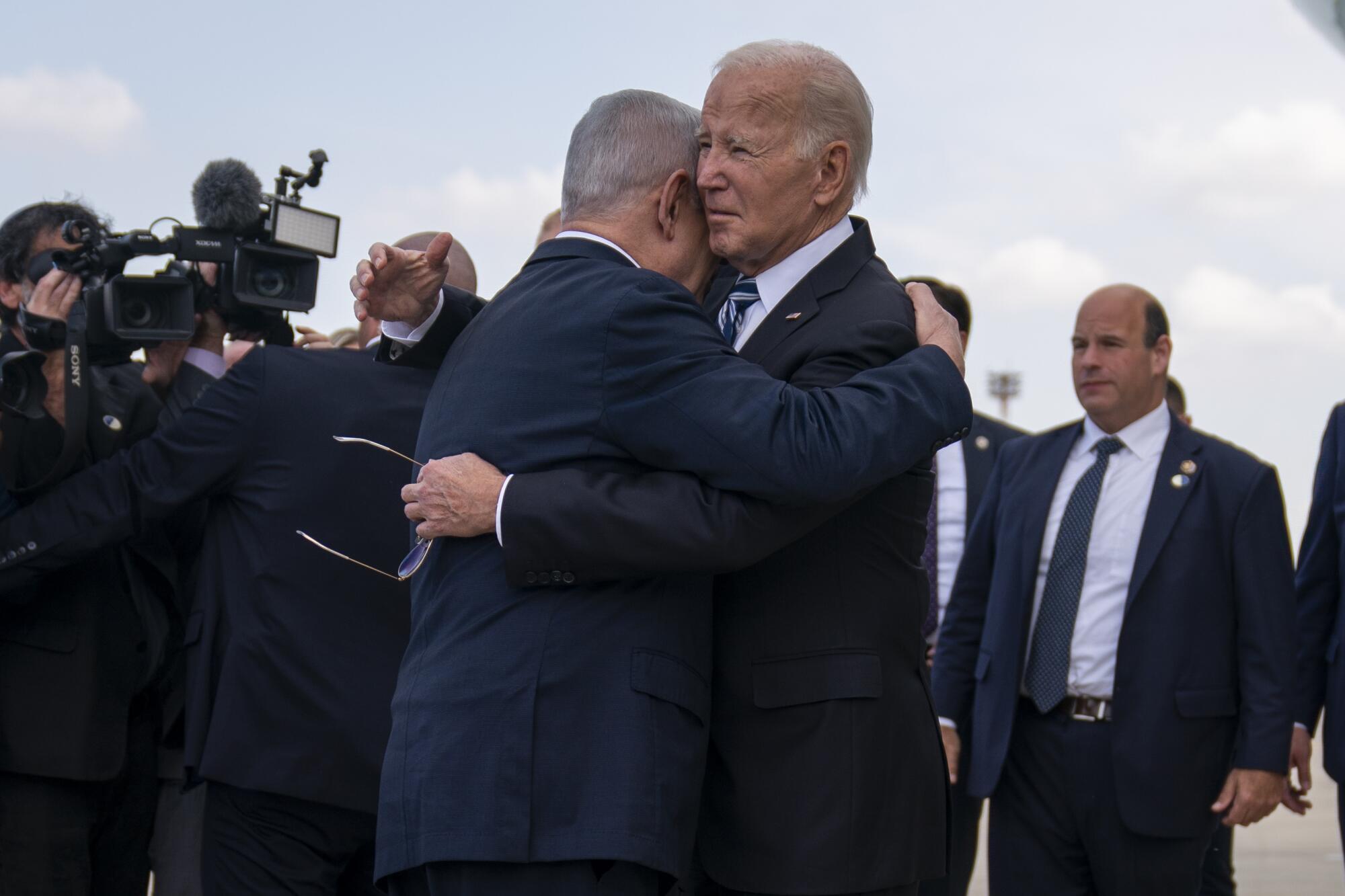
In his brief visit, Biden tried to strike a balance between showing U.S. support for Israel, while containing spiking alarm among Arab allies over its toll after Tuesdayâs explosion. Upon his arrival, Biden embraced Netanyahu â and expressed concern for the suffering of Gazaâs civilians.
Biden said the hospital blast appeared not to be Israelâs fault. âBased on what Iâve seen, it appears as though it was done by the other team, not you,â he told Netanyahu in remarks in front of the media.
After the hospital blast, Jordan canceled a meeting Biden was to have with Jordanian King Abdullah II, Palestinian Authority President Mahmoud Abbas and Egyptian President Abdel Fattah Sisi.
Biden will travel to the Middle East in a show of support for Israel, but concerns over a humanitarian crisis could overshadow the visit.
The war between Israel and Hamas was âpushing the region to the brink,â Jordanian Foreign Minister Ayman Safadi told state-run television.
The Israeli military held a briefing Wednesday morning to lay out its case for why it was not responsible for the explosion at the Ahli Arab Hospital.
Israeli military spokesman Rear Adm. Daniel Hagari said it was not firing in the area. And, he said, Israeli radar detected a rocket barrage fired by the Palestinian militant group Islamic Jihad from a nearby cemetery at the time of the blast, around 6:59 p.m. Independent video showed one of the rockets in the barrage falling out of the sky, he said.
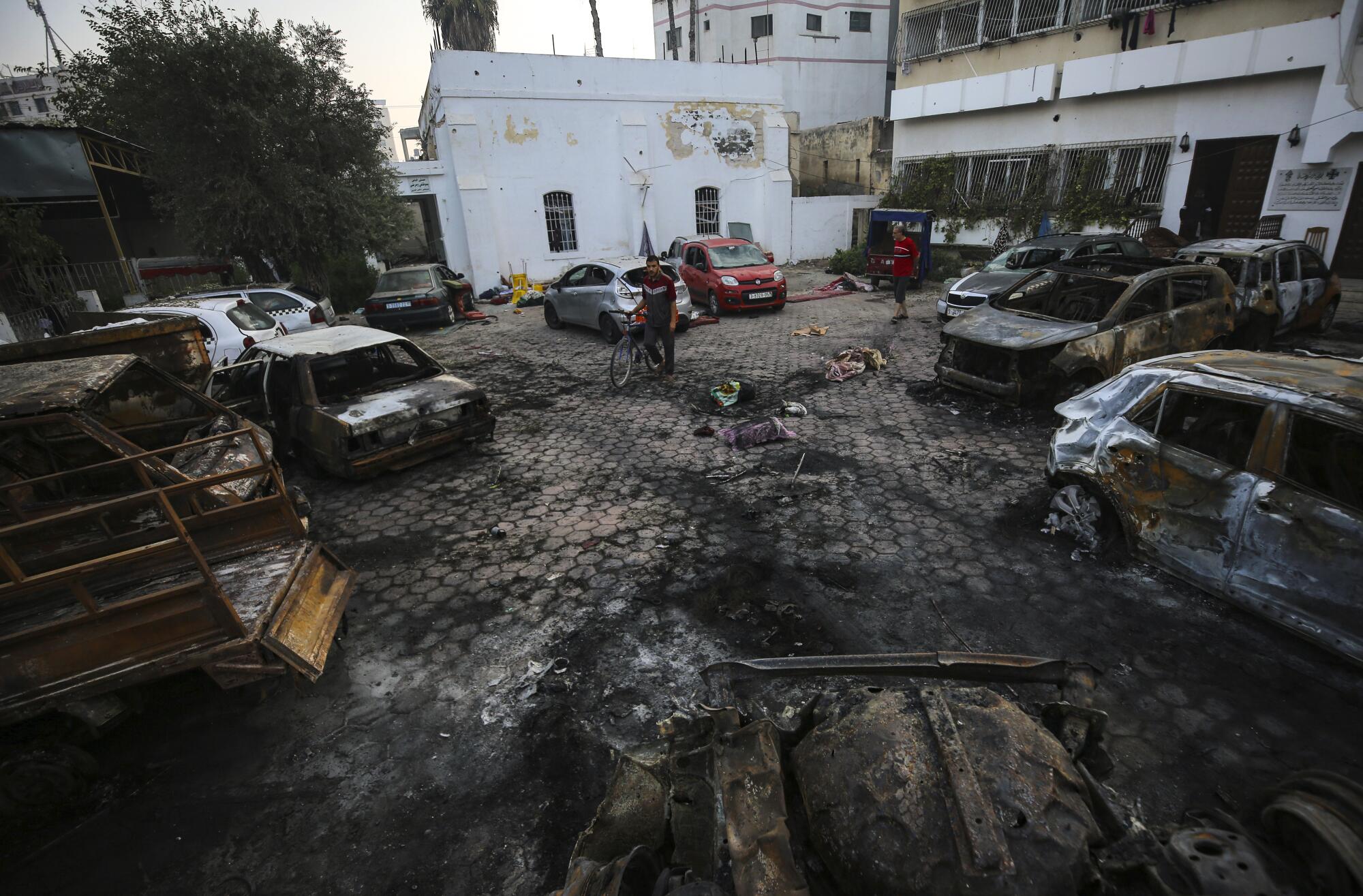
The misfired rocket hit the parking lot outside the hospital. Were it an airstrike, there would have been a crater there; instead, the fiery blast came from the misfired rocketâs warhead and its unspent propellant, he said.
Hagari said Israelâs intelligence would be shared with U.S. and British officials.
Since the war began, roughly 450 rockets fired at Israel by militant groups had landed in Gaza, the military said.
Israel-Hamas war: In Israel, a quest to identify unrecognizable bodies. In Gaza, bodies are piled and some stored in ice cream trucks as power fails.
Hamas called Tuesdayâs hospital blast âa horrific massacre,â saying it was caused by an Israeli strike. Islamic Jihad dismissed Israelâs claims, accusing Israel of âtrying hard to evade responsibility for the brutal massacre it committed.â
The group pointed to Israelâs order that Ahli be evacuated and reports of a previous strike at the hospital as proof that the hospital was an Israeli target. It also said the scale of the explosion, the angle of the bombâs fall and the extent of the destruction all pointed to Israel.
The Anglican bishop of Jerusalem, Hosam Naoum, confirmed that the hospital, run by the Episcopal Church, had received at least three Israeli military orders to evacuate in the days before the blast. It was hit by Israeli shelling Sunday, wounding four staffers, he said. Israel had ordered all 22 hospitals in northern Gaza to evacuate last week.
Naoum declined to cast blame on either party for the blast. âAs people of the cloth, we are not military experts. ⌠We just want to let people see what is happening on the ground and hope that people will come to the conclusion that weâve had enough of this war,â he said.
The blast left gruesome scenes. Hundreds of Palestinians had taken refuge in Ahli and other hospitals in Gaza City hoping to be spared bombardment after Israel ordered all residents of the city and surrounding areas to evacuate to the southern Gaza Strip.
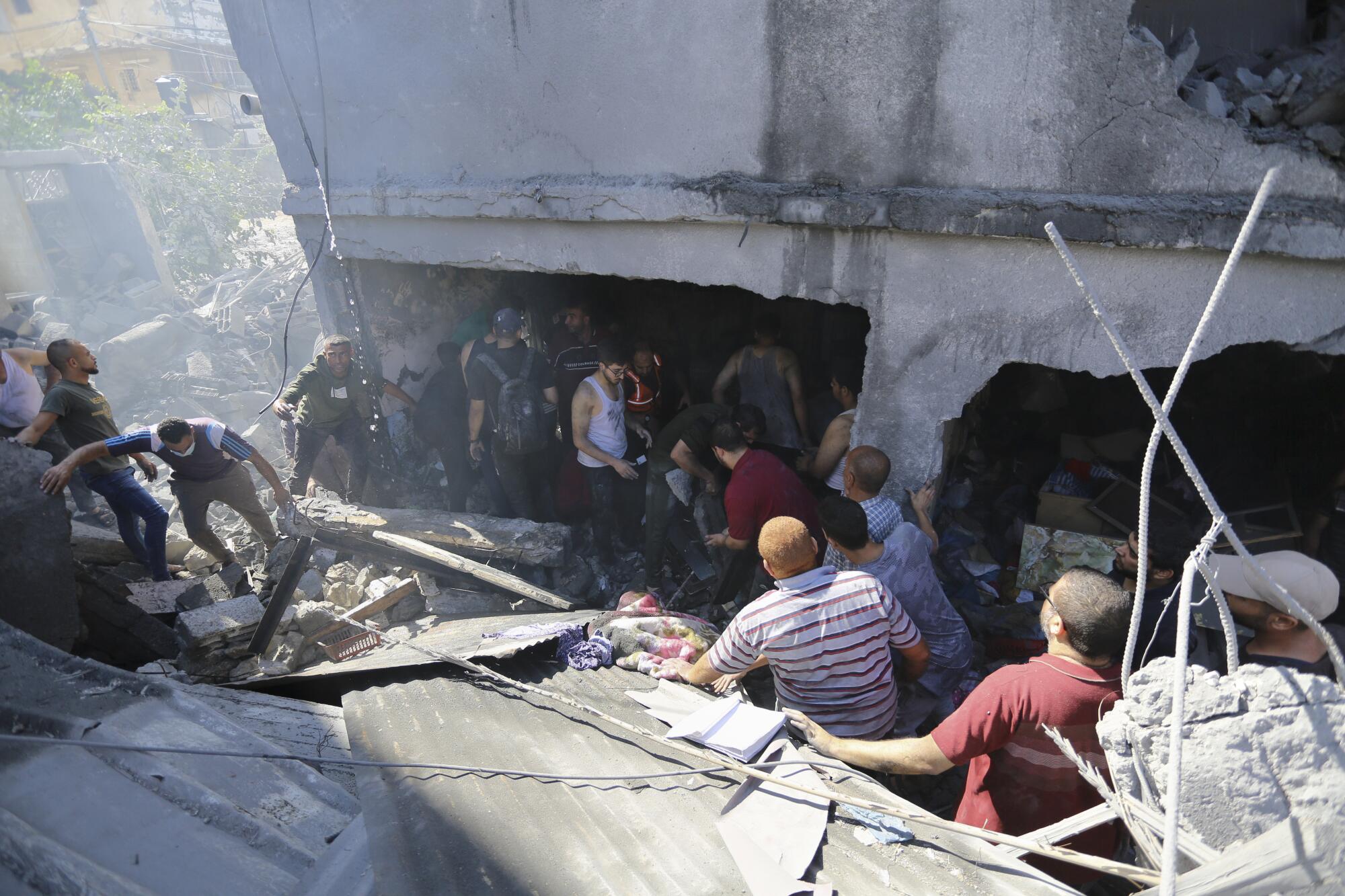
Video after the blast showed the hospital grounds strewn with torn bodies, many of them young children.
On Wednesday morning, the blast scene was littered with charred cars and the ground was blackened. One man who had been sheltering there with his family, Mohammed Hayek, said he was sitting with other men in a hospital stairwell Tuesday night, idling away the hours but wary of sitting in the yard.
He stepped away to get them coffee when the blast hit.
âWhen I returned, they were torn to pieces,â he said. Struggling to speak, he pointed to where their bodies had lain. The stone walls were still splattered with blood. âNo one knows anyone,â he managed to say, referring to the difficulty in identifying the victims.
Ghassan Abu Sitta, a plastic surgeon working at Alhi, said he heard a loud explosion and the ceiling of his operating room collapsed.
âThe wounded started stumbling toward us,â he wrote in an account posted to Facebook. He saw hundreds of dead and severely wounded people. âI put a tourniquet on the thigh of a man who had his leg blown off and then went to tend to a man with a penetrating neck injury,â he said.
Hundreds of Palestinian Americans are reportedly stranded in Gaza, frantically searching for ways to flee before Israelâs expected ground assault.
The death toll from the hospital blast was in dispute, even among those in Gaza. The Health Ministry initially said 500 had died but revised that number slightly to 471 on Wednesday, without giving details of the dead. Ahli Arab Hospital officials said only that the toll was in the hundreds. Mohammed Abu Selmia, director of Gazaâs overwhelmed main hospital, Shifa, where many victims were taken, said he thought the toll was closer to 250.
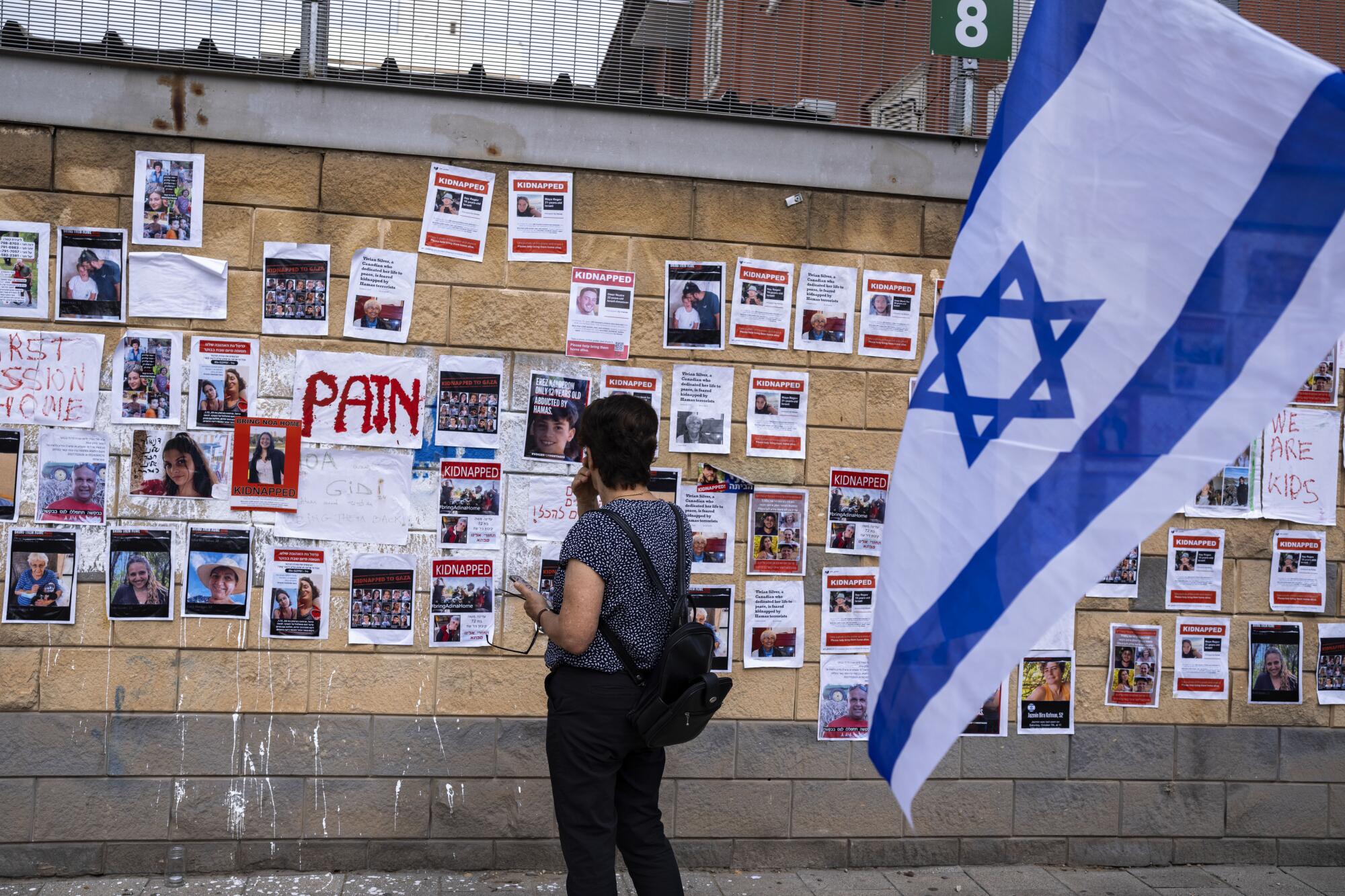
The Gaza Health Ministry said at least 3,478 people have been killed in Gaza and more than 12,000 wounded, with most of the casualties women, children and the elderly. Another 1,300 people across Gaza are believed to be buried under the rubble, alive or dead, health authorities said.
More than 1,400 people in Israel have been killed, mostly civilians who were slain in Hamasâ multipronged attack. The assault also resulted in some 200 Israelis being taken captive into Gaza, Israel said. Militants in Gaza have launched rockets every day since, aiming at cities across Israel.
Breaking News
Get breaking news, investigations, analysis and more signature journalism from the Los Angeles Times in your inbox.
You may occasionally receive promotional content from the Los Angeles Times.
With its troops massed along the border, Israel has been expected to launch a ground invasion into Gaza, though military officials say no decision has been made.
A strike on a three-story building in Gaza City on Wednesday killed 40 people, and another on a bakery in the Nuseirat refugee camp in central Gaza killed four bakers, according to witnesses.
The Israeli military said it was targeting Hamas hideouts, infrastructure and command centers, and accuses the militants of hiding among civilians.
Aid workers warned that the situation was growing perilous.
âItâs not just that people are going hungry. People are at the risk of starvation,â said Alia Zaki, a spokesperson for the World Food Program. âThere is a major shortage of essential items that will run out within days.â
More than 1 million Palestinians have fled their homes â roughly half of Gazaâs population â and 60% are now in the approximately eight-mile-long area south of the evacuation zone, the U.N. said.
More to Read
Sign up for Essential California
The most important California stories and recommendations in your inbox every morning.
You may occasionally receive promotional content from the Los Angeles Times.
